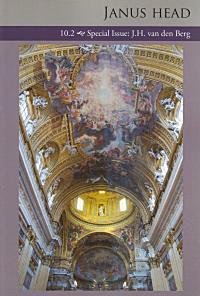 Janus Head Janus Head
10.2
Special Issue
J.H. van den Berg

Travels Inside the Archive
Robert Gibbons
Edge of Maine Editions

Beyond Time
New & Selected Work
1977 - 2007
Robert Gibbons
 The Age of Briggs & Stratton The Age of Briggs & Stratton
Peter Culley
|
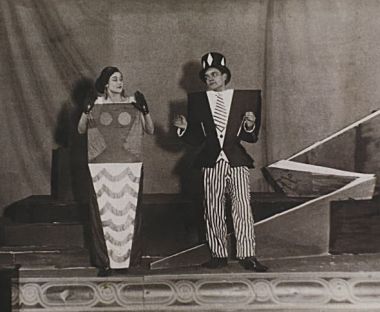
Scene from "The Gas Heart" by Tristan Tzara.
Costumes designed by Sonia Delaunay
Theatre Michel, Paris, July 6-7, 1923
_______________________
High Decoration:
Sonia Delaunay, Blaise Cendrars, and the Poem as Fashion Design
Carrie Noland
Although critics have exerted much effort in attempting to clarify Cendrars' debt to Apollinaire and, conversely, Apollinaire's debt to Cendrars, the influence of Robert and Sonia Delaunay's simultaneous contrast technique upon Cendrars' work has never been properly explored. It is clear, however, that the remarkable stylistic modifications that Cendrars' poetry underwent during the year 1913 can be attributed primarily to his frequent visits to the Delaunay home. Robert Delaunay's theory of simultaneous contrast was responsible for the pastiche compositional technique of Sonia Delaunay's "robe simultanée" and, I will argue, for the pastiche quality of the poems of Dix-neuf poèmes élastiques. Introduced by Robert Delaunay and elaborated on by his wife, the technique was based on Michel-Eugène Chevreul's theory that the perception of color values is determined by the contrast of juxtaposed tones. The Delaunays transformed Chevreul's theory into a technique of "simultanéité" roughly defined by Cendrars in 1914 as the process by which one entity gains its identity through contrast with another (Aujourd'hui 71-2). Anticipating the postmodern fascination with surface juxtapositions, the Delaunays reinterpreted pictorial depth or "profondeur" as an illusion produced by surface planes of color rather than by vanishing-point perspective. It was this reconception of depth as a function of surface design that stimulated Cendrars' interest in citational pastiche....
Poetry at stake: lyric aesthetics and the challenge of technology
Carrie Noland google books
_______________________
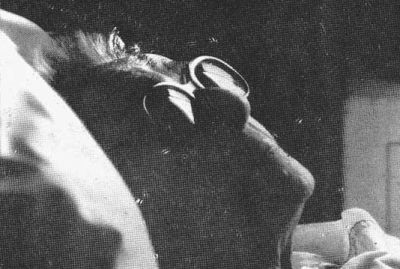
Sonia Delaunay
b. 14 November, 1885
photo - David Seidner
Sonia Delauney
David Seidner
BOMB Magazine
A world of color would be ideal, where one could create emotions accordingly. We could live by impressions the way a blind man lives by touch. We could vivify or seduce, transmute or emote, the possibilities are endless. A world of color so fine and pure, from the deepest innermost part of the human body to the pale washed evasiveness of the white of the human eye. We could live in a constant state of aura where every feeling manifested itself by color thus removing the lie from mankind.
Sonia Delaunay entered so far inside as to reach the womb. She returned not only to primitive sensibility in terms of the universal, but also in terms of woman, of motherhood. As early as 1911, Delaunay delved into the non-objective world....(more)
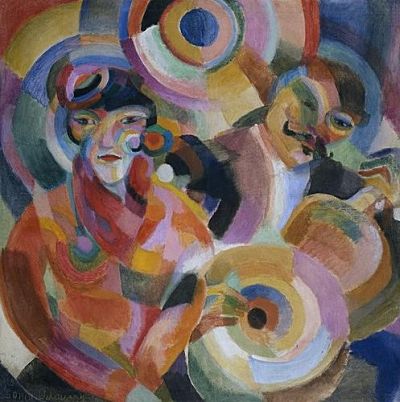 Flamencosänger
Sonia Delaunay
1915
_______________________
Poetry
Marianne Moore
I, too, dislike it: there are things that are important beyond
all this fiddle.
Reading it, however, with a perfect contempt for it, one
discovers in
it after all, a place for the genuine.
Hands that can grasp, eyes
that can dilate, hair that can rise
if it must, these things are important not because a
high-sounding interpretation can be put upon them but because
they are
useful. When they become so derivative as to become
unintelligible,
the same thing may be said for all of us, that we
do not admire what
we cannot understand: the bat
holding on upside down or in quest of something to
eat, elephants pushing, a wild horse taking a roll, a tireless
wolf under
a tree, the immovable critic twitching his skin like a horse
that feels a flea, the base-
ball fan, the statistician--
nor is it valid
to discriminate against "business documents and
school-books"; all these phenomena are important. One must make
a distinction
however: when dragged into prominence by half poets, the
result is not poetry,
nor till the poets among us can be
"literalists of
the imagination"--above
insolence and triviality and can present
for inspection, "imaginary gardens with real toads in them,"
shall we have
it. In the meantime, if you demand on the one hand,
the raw material of poetry in
all its rawness and
that which is on the other hand
genuine, you are interested in poetry.
_______________________
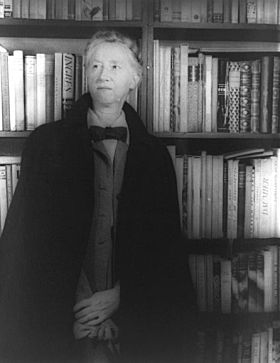
Marianne Moore
b. 15 Nov. 1887
photo by Carl Van Vechten
_______________________
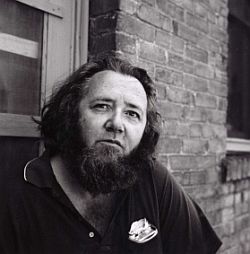
Ted Berrigan
b. 15 Nov. 1934
photo by Laverne Harrell Clark
Ted Berrigan at PennSound
Buddha On The Bounty
Ted Berrigan
for Merrill Gilfillan
"A little loving can solve a lot of things"
She locates two spatial equivalents in
The same time continuum. "You are lovely. I
am lame." "Now it's me." "If a man is in
Solitude, the world is translated, my world
& wings sprout from the shoulders of 'The Slave' "
Yeah. I like the fiery butterfly puzzles
Of this pilgrimage toward clarities
Of great mud intelligence & feeling.
"The Elephant is the wisest of all animals
The only one who remembers his former lives
& he remains motionless for long periods of time
Meditating thereon." I'm not here, now,
& it is good, absence.
_______________________

photo - mw
_______________________
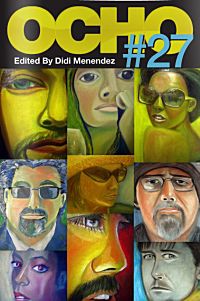
OCHO #27
Edited by Didi Menendez
and featuring MiPO's community of writers
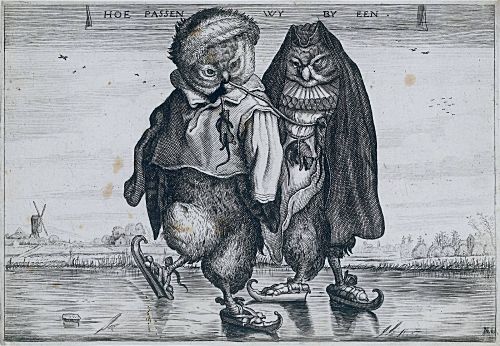
Adriaen Pietersz van de Venne
1589 - 1662
_______________________
Oasis 3
Barbara Mor
ctheory
the small blue man a small man tends the door,he wears a
blue jacket,all is glassy silence bldgs &parkinglotEmpty,the
sun exists at some angle to the sky the small blue man is
almost not there,he is Tokwah who opens the door
as many years,the
close world,vinous enclosed &moistured green film,earth
enwrapt in its sweat &thick creations,who is mouth,stink
&eating who is water(jaguar,Fire) in a jungle of entropic
things he thinks he is many dreams all sensate cells,all
skins explode,Omnivorous of desire elderly blue person,or
shrunk white man,all thats left, arthritic &hypnotic,at the
turnstyle inside the door(inside the plaza inside the
wonder)aGreeter,can barely stand or move yet humbly
mechanical for the job,the doors of automatic sliding
glass,of hisEyes,open beyond mortality &theSilence
everywhere that was aWorld flesh floor,liveMezzanines
of air,anaconda flowers rain eyes lickt day&night w/
paradise,bodies consuming the display of bodies
rapturous or w/out commentary,except orange purple
yellow noise explosions in anOracular skull he counts
fireants crocodiles bats millipedes piranhas,ecstatic
merchandise heThinks bright red blood eyes as a bird
flies up this parrot screeching words &becomes a clever
man there was aTree,ocean in aTree,Tokwah hooks
out a great flood & everything drowns,rivers pour out
his orificesPissing& preachingFever his monkey tricks
penetrate himself,a slippery muscle poison always
lustful always hungry &mens milk,intercourse w/
toads,a thorn in the squirmy anus extrudes secretion
abundantly,dipt w/petals on penis& theMind he makes
semen the invention of(adultery &murder)
so that you remain dead,so
that you are dead,he madeDeath,thisBrain glows in the
dark,binocular &cruel,scares away return ofGhosts
until theWorld closes,now they come
...(more)
Oasis 1 and 2
_______________________
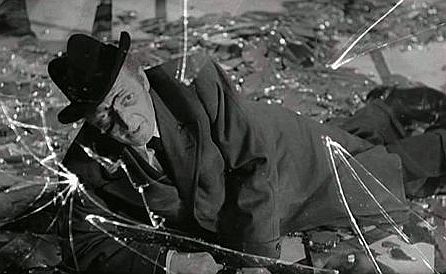 The Lady from Shanghai
Is it Written in the Stars?
Global Finance, Precarious Destinies
Brian Holmes
Continental Drift
This essay inquires into the workings – and indeed, the work force – of a variety of capitalism that has spread outwards from its Anglo-American core to reshape the entire planet. At the center of contemporary capitalism is a set of financial instruments called derivatives, and a group of people called traders. The text draws links between their highly abstract formulas and the aesthetics of lived experience in the world’s major cities. For that it begins not with the azure sky, but with the curve of a dark horizon.(....)
Today it is the mirror-maze of the speculative economy that lies in ruins, and the question is how to forget the impossible desires projected from the financial stars above, how to imagine other destinies. Yet what seems likely, if the current political passivity continues to reign, is that the multitudes of artificial lifeforms that flourished briefly in the glass-house environments of the financial capitals will now just fade away like the swarms of lesser creatures in Black Shoals, leaving the major predators with their weapons intact, still firing at each other. The danger is that the present crisis – with a magnitude comparable at least to that of the 1970s, if not the 1930s – will be resolved by those at the top of the social hierarchy, who are now attempting to reboot the speculative economy. In that case, the profound reshaping of social institutions required to end the crisis will be decided exclusively by them. If we want to make an egalitarian change in our world model, it’s urgent to understand what happens in the boom-bust cycles – before they are used against us once again.(....)
The lifeform of the financial markets is now animated by these meta-commodities, which lend the new cityscapes their dazzling character. But what the pulsating lights of the central business districts hide is the privatization of the social state – indeed, the privatization of government. Gentrification is the fetishism of severed democratic relations.(....)
The kind of “play-labor” celebrated by the pundits of Web 2.0 may have had transgressive connotations in the 1960s, but today it is only a grotesque parody of Huizinga’s homo ludens, or of the sublimated sexual drives that Marcuse explored in his revolutionary book, Eros and Civilization. What has disappeared from the networked cultures of casino capitalism is the willingness to engage in political conflict – even while the civilizational forces of Thanatos, or unbridled aggression, bear down on the biosphere. Now it is those aggressive drives that must be sublimated and channeled into a necessary struggle. Rather than draping aesthetic and epistemological veils over blatant expropriation, shouldn’t artists and knowledge workers seek political confrontations with those who set the rules of the game?...(more)
via Jodi Dean
_______________________
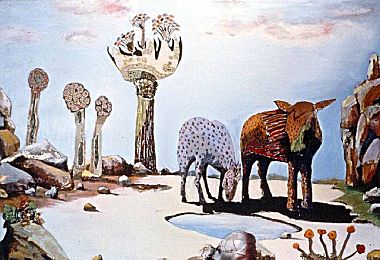
Oasis
Benny Andrews
November 13, 1930 - November 10, 2006
1 2
_______________________
Dolor
Theodore Roethke
I have known the inexorable sadness of pencils,
Neat in their boxes, dolor of pad and paper-weight,
All the misery of manilla folders and mucilage,
Desolation in immaculate public places,
Lonely reception room, lavatory, switchboard,
The unalterable pathos of basin and pitcher,
Ritual of multigraph, paper-clip, comma,
Endless duplication of lives and objects.
And I have seen dust from the walls of institutions,
Finer than flour, alive, more dangerous than silica,
Sift, almost invisible, through long afternoons of tedium,
Dropping a fine film on nails and delicate eyebrows,
Glazing the pale hair, the duplicate gray standard faces.
_______________________
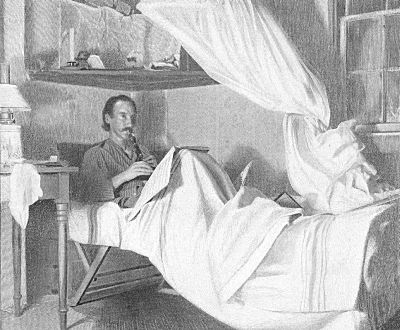
Robert Louis Stevenson
November 13, 1850–December 3, 1894
playing his flageolet
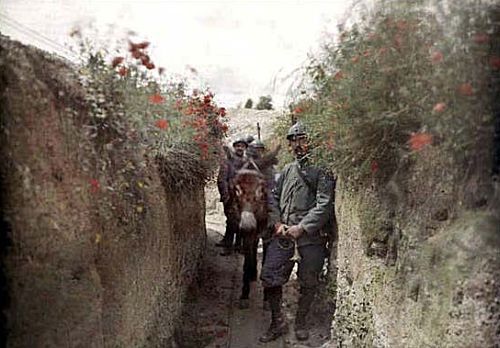
Poppies
Spring 1916 The Heritage of the Great War
_______________________
And so, convinced of this, he sees that he must follow the counsel of the wise spirit, the dread spirit of death and destruction, and therefore accept lying and deception, and lead men consciously to death and destruction, and yet deceive them all the way so that they may not notice where they are being led, that the poor blind creatures may at least on the way think themselves happy.
-
Dostoevsky, The Grand Inquisitor
The Brothers Karamazov
_______________________
An isolated note on Everything Passes
Stephen Mitchelmore
Everything Passes then is not so much a metafiction reflecting with postmodern knowingness on the elemental opening 18 pages than an Orphic gaze into the underworld of art and our inner lives. In exploring the issue within a novel, Josipovici implicates itself and our reading in the same process. The voices we hear resonate uncannily in our mind, offering the possibility of real expression and dialogue outside of all constraints imposed by the genre of the novel, yet also threatening to reinforce them with yet another beginning, middle and end. It is difficult to distinguish between the pathway and the cul-de-sac. To do so, we have to read, listen and write again. For the man standing at the cracked window things begin to look brighter as, toward the end of the novel, he finds release in creative life, only to make a discovery that seems to reverse all progress. Everything Passes risks such failure as no other English novel dare fail. ...(more)
_______________________
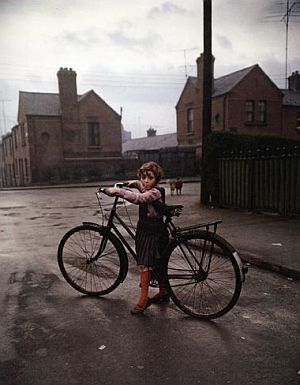
Evelyn Hofer
1922-2009
1 2 3 4 5
_______________________
A Good Without Light
Sustainability's seamy underbelly
Curtis White
Tin House
For environmental, business, and political organizations alike, the term that has come to stand for the hope of the natural world is “sustainable.” Sustainable agriculture. Sustainable cities. Sustainable development. Sustainable economies. But you would be mistaken if you assumed that the point of sustainability was to change our ways. It’s not, really. The great unspoken assumption of the sustainability movement is the idea that although the economic, political, and social systems that have produced our current environmental calamity are bad, they do not need to be entirely replaced. In fact, the point of sustainability often seems to be to preserve—not overthrow—the economic and social status quo.(....)
What no one is allowed to consider is the distressing possibility that no amount of tinkering and changing and greening and teaching the kindergartners to plant trees and recycle Dad’s beer cans will ever really matter if our assumptions about what it means to be prosperous, what it means to be “developed,” what it means to live in “progress,” and what it means to be “free” remain what they have been for the last four hundred years under the evergrowing weight of capitalist markets and capitalist social relations. As Marx put it, under capitalism we carry our relation to others in our pockets. Marx would now have to add, sadly, that those “others” must now include the animals of the field and the birds of the sky (Daniel, 2:38) as well as the fields and sky themselves.1 But such a line of thought is not tolerated because the very word “capitalism” (not to mention “Marx”) is a fighting word.2 (Or, worse, it is a sort of faux pas to speak of “capitalism” at all; you’d be better off saying “the economy,” just as if you were a slave asked to refer to your master as your employment counselor.) Unfortunately, in banishing this word we eliminate from the conversation the very thing we came together to discuss. We can talk about our plans to save the world, but we can’t talk about the economic system that put it in jeopardy in the first place. That’s off the table.
But I do not believe that capitalism is somehow singularly at fault. I don’t even think that it is necessarily bad. It is too reductive to say simply that there are cruel and greedy and violent people among us (capitalists), and that we need somehow to confront them and assert the good in ourselves. The truer problem is that the people who are destructive honestly believe that they are doing good. They are more often than not, or more often than any of us should be comfortable with, an expression of the virtues of what I call the Barbaric Heart....(more)
via riley dog
_______________________
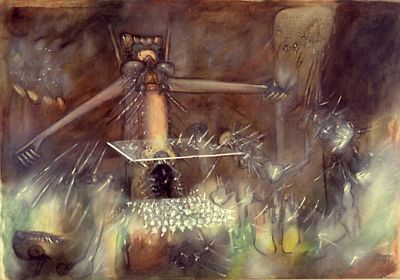
The Un-Nominator Renominated
1952-53
Roberto Matta
Nov 11, 1911 – Nov 23, 2002
_______________________
Invasion of the Body Snatchers
larvalsubjects on Repetition
From the standpoint of object-oriented ontology, I find meme theory extremely attractive precisely because meme theory treats memes as real objects or actors in the world.
(....)
With the emergence of memes a new replicator enters the world, very different from genes. Memes or cultural ideas, symbols, and practices, are like genes in that they aim to get themselves replicated, however as unique replicators they do not act at the behest of genes. In other words, we now get what could be called a “conflict of the replicators”. Genes can struggle with memes. Memes can struggle with genes. Memes and genes can collaborate with one another. However, like all alliances, a collaboration of memes and genes is a temporary strategy to advance the replication of genes and the replication of the memes that can be dissolved when this relationship no longer advances one or the other. It is even feasible that memes, at some point, could dispense with genes altogether if they find new and more effective ways to replicate themselves, no longer requiring organic bodies like brains to be passed along. This, for example, is what is depicted in films like Terminator or The Matrix where the machines (and machines are memes) have been liberated from human bodies and strive to replicate themselves apart from humans.
The key point is that with memes new relationships to the world and biology emerge. Thus when a soldier dies in battle while storming the beach at Normandy, this soldier has died so that certain memes might be replicated, not for the sake of his genes. When someone practices abstinence before marriage, they are acting on behalf of memes, not genes. These new objects or actors, memes, fundamentally change how we relate to ourselves, our biology, and memes. Indeed, in a theorization worthy of Lacan or Freud, Dennett compares memes to foreign and alien entities that come to infest our brains, creating persons, where persons are what emerge as a sort of conflict between our biology or genes and these units of culture. It is not difficult to discern something akin to Lacan’s parasitic and alien signifiers that so transform our relation to our bodies and the world in this concept of memes. ...(more)
_______________________

Evelyn Hofer
_______________________
Eight Poems
John M. Bennett
otoliths
The Lightbulbs Exploded
throttled bag ,woods filled with
shining sticks and bottles flame
walks inside my hat puzzled
logor apta fingering ,dot latex buz
zed and staples ,leaves like
plastic bags the creek streams
with oil and rotting eggs the
basement locked and flooded my
lungless floating book my spitting
at the window my eyes open
in the greying light
_______________________
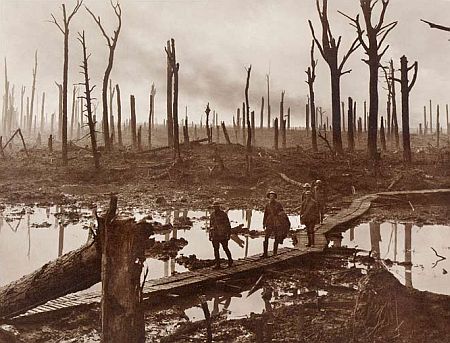
Chateau Wood, Flanders
Frank Hurley
1917
_______________________
"Say what you will about the sweet miracle of unquesting faith. I consider the capacity for it terrifying."
-
Kurt Vonnegut, Jr. (November 11, 1922 – April 11, 2007

casino employee's day
Simplifying Chaos
Jeremy Kohm
Camera Obscura
_______________________
Sweatshop: The History of an American Idea
Laura Hapke
pdf - aaaarg - reg. req.
The sweatshop is as American as apple pie. But what has it meant to the American imagination? Scholars, of course, have long told the story of sweated labor. Of late, excellent work by Andrew Ross, Edna Bonacich and Richard Applebaum, and others has clarified our understanding of the sweatshop from its antebellum origins to the era of cyberspace.1 My concern here, though, is the language, verbal and pictorial, in which the sweatshop is imagined and its stories told. A century and a half of writings on the shop, punctuated by graphic art, does more than narrate or define. Even in the writings of authors who seek “scientific” definitions, language itself undermines, refashions, challenges, and sometimes contradicts the official goals of policy makers, advocates, and workers themselves. For this multitude of storytellers, the invented is submerged in the real sweatshop. I use the word “story” here in the broadest sense. It is an imaginative construction, yes, but one that relies on the rhetoric, helps organize the knowledge, and is the repository of its culture’s (or subculture’s) beliefs and myths, assumptions, and prejudices.(....)
Charting the idea of the sweatshop to the citizens of the United States is an important act of historical reconstruction. The core of my book is a study of the many representations of the sweatshop: prolabor, entrepreneurial, mass-cultural, social documentary, literary, and artistic. Necessarily, I am also interested in the battle to wrest representational control of the sweatshop narrative. Who would write the “song of the shop”? Who would paint or photograph it? Which were the more authentic narratives? What tropes, convictions, and fugues emerge consistently over time and across discourses? Does today’s reiterated claim that sweatshops raise the standard of living in the Third World, combining global expediency with compassion, form a new narrative? Or is it simply the old story retold?
_______________________
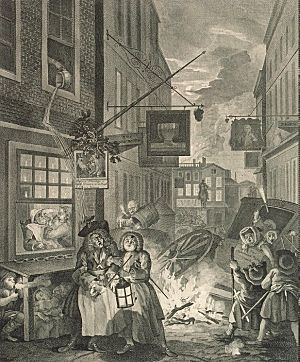
Night
William Hogarth
1738 _______________________
The Will of Achilles
Robert Kelly
Conjunctions:53 ::: Special Online Feature
(....)
4.
Every city has a slim identity—
hard to grasp it, sometimes young man
or woman glimpsed at a window
or old man a-doze beneath a tree.
This city was a man,
a wifed man and a children’d man
and a man with father, with mother.
No wonder he has to die.
I belong to too many, Hector sighed.
Let the walls of my city fall down on me.
But the walls stood.
5.
If only none of this were true
and one man could befriend another
and the crows find other food beyond the mountains
and Scamander ran clean over golden gravel.
It is the ship’s fault,
Achilles thinks,
if only ships had never been invented
we would stay at home
on the rough fertile uneven plains of Thessaly
or all those rocky little islands.
The terrible migrations of people—
without travel there would be no war.
...(more)
_______________________
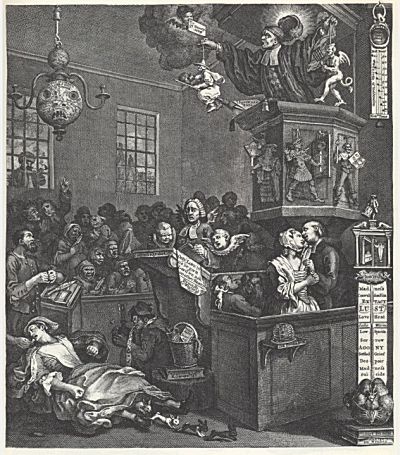
Credulity, Superstition, and Fanaticism
1761
William Hogarth
b. Nov. 10, 1697
_______________________
All these activities-critical philosophy, literary theory, history resemble
each other in the fact that they do not resemble that from
which they derive. But they are all interlinguistic: they relate to what
in the original belongs to language, and not to meaning as an extralinguistic
correlate susceptible of paraphrase and imitation. They disarticulate,
they undo the original, they reveal that the original was always
already disarticulated. They reveal that their failure, which
seems to be due to the fact that they are secondary in relation to the
original, reveals an essential failure, an essential disarticulation
which was already there in the original. They kill the original, by discovering
that the original was already dead. They read the original
from the perspective of a pure language (reine Sprache), a language that
would be entirely freed of the illusion of meaning-pure form if you
want; and in doing so they bring to light a dismembrance, a de-canonization
which was already there in the original from the beginning. In
the process of translation, as Benjamin understands it - which has little
to do with the empirical act of translating, as all of us practice it on
a daily basis - there is an inherent and particularly threatening danger.
The emblem of that danger is Holderlin's translations of Sophocles:
Confirmation of this as well as of every other important aspect is
supplied by Holderlin's translations, particularly those of the two
tragedies of Sophocles. In them the harmony of the languages is so profound
that sense is touched by language only the way an aeolian harp is
touched by the wind. . . . Holderlin's translations in particular are subject
to the enormous danger inherent in all translations: the gates of a
language thus expanded and modified may slam shut and enclose the
translator with silence. Holderlin's translations from Sophocles were
his last work, in them meaning plunges from abyss to abyss until it
threatens to become lost in the bottomless depths of language.
Translation, to the extent that it disarticulates the original, to the extent
that it is pure language and is only concerned with language, gets
drawn into what he calls the bottomless depth, something essentially
destructive, which is in language itself.
"Conclusions" on Walter Benjamin's "The Task of the Translator" Paul De Man Messenger Lecture,
Cornell University, March 4, 1983
included in
Paul de Man Essay Collection
pdf - aaaarg - free reg. req.
_______________________
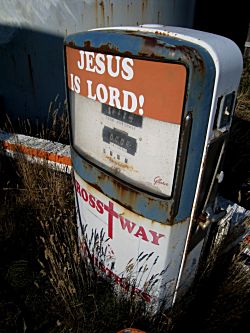
Monday Prayer
By mjs
Jesus' General
Lord, who is God of all that is oilesque
And tar-like, and greasy, and flammable
Dear Lord, may it please you to know
Our wimpy concerns about the environment have abated
Our vision to Vietnamize Afghanistan is proceeding
Our commitment to burn the Black Gold is solid
We burn it in your name, Dear God Man Guy Lord
Oh Yahweh, who doesn't like to be called That
We sing your praises, for You seek our praise
Which is your thing, don't get us wrong, but...
Perhaps you wouldn't kill so many of us if you, well, you know
Took some responsibility...
Forgive us, Lord, for we are made in your likeness
And are therefore full of thine Piss & Vinegar
...(more)
_______________________
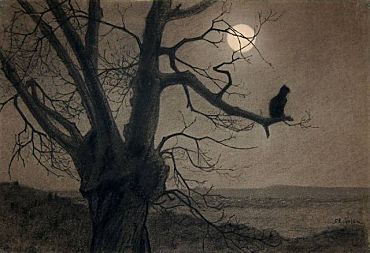
Théophile Alexandre Steinlen
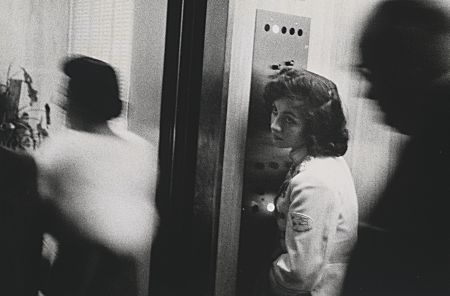
"Elevator—Miami Beach, 1955"
Robert Frank
_______________________
Cartographer At Work
Meredith Quartermain
Beside the tax authority, the macro-brewery, the flags and the ever-burning flame in Seaforth Armories Peace Park, Cartographer boards the Knight bus – Robert Knight (1829-1913) claiming fame for owning property in South Vancouver. The word roars off over the Burrard Bridge, on a route of its own: Harry Knight, a BC photographer, preferred soft-focus pictorial moodiness; John Knight, Captain RN, got his name on the Kwakwaka’wakw inlet where thousands of first nations people fished for Eulachon (he’d served in the American Revolutionary War with Vancouver’s right-hand man, Captain Broughton); The Knights of Labor in the 1880s elected Vancouver’s second mayor, lobbied for a shorter work-day, tried to stop the import of low-paid Asian workers. The word roars on through the meccano-set girders of the bridge: a feudal tenant trained for mounted combat; a man devoted to the service of a woman; a horse-head chess-piece that moves in L-shaped leaps. By sea and land we prosper, says the city motto on the bridge house – a lumberjack and a seaman hold up the city coat of arms.
On the bus, people gaze with bussed-eyes through steamed-up windows splattered with rain drops. There’s a sudden reek of disinfectant as a man walks down the aisle. Wipers idiotically, hypnotically sweep and stop, sweep and stop. People read. Hold their heads up. Wet walkers get on. Ball-cap guys with not much work and a few days beard. Death by Chocolate, touts a passing store. Wet people slump in seats, or smear fog off the windows – trying to see out of the Knight bus, while Cartographer records latitude and longitude for land, sea and air, and wonders whether The Amphibians (of BC) could be like The Bostonians (of Boston) or The White Oaks of Jalna.
Meredith Quartermain at EPC_______________________

The Wooden Library in Alnarp
The Wooden Library in Alnarp is a unique collection of "books", each part describing a certain species or variety of tree or shrub. The collection consists of 217 volumes and was made in Nürnberg in Germany between 1805 and 1810.
Wooden libraries - or xylothek, from the Greek words for tree, xylon, and storing place, theke - flourished for a short period in history, around 1790-1810, mainly in Germany. They were a further elaboration of the cabinets of natural curiosities that was common during the 18th century, and consisted of simple pieces of wood specimens placed together in some kind of cupboard. In a refined form it took the shape of "books" where you could find details from the tree inside and arranged as a "library".
_______________________
Matter 9: To texture to verb
Meredith Quatermain
beached on the coast of specific gravity
at sea with fancy and sand for judgment
wonder steps on clams and mussels of metaphor
to skull and jaw, employing language to preposition.
To part in speech chalk and cheese, a dock
and a daisy – how very like a whale –
the moths, beetles, flies of Matter flutter
to harlequin Abstraction. Or vamp
the moods and tenses of Intellect. Then fidget Space
to veer, jibe, sidereal Volition
and shimmer Affection’s galaxy of spasms.
Suppose to patchwork world, hands wings fins
hook in peculiar loops the arteries of eggs in nests,
the spawn of the frog in water
the stripes on the cub of a lion,
the spotted chicks of blackbirds –
hook the framework’s splanchnology.
Suppose the tissue of matter is the change of matter,
its cleavage and strata – suppose we know what changes
changes sense.
It’s touch and go with the cat-tribes and plumage of stuff,
this disparate desperate otherwise.
Yes, we know means eyes and antennae
weave tooth
or grain a home-spun woolly cotton.
To text, to specify –
a whole without coherence
to sprinkle terrain, a world-thing mixed –
pregnant with alloy, laced with entanglement,
and haunted with purity.
Meredith Quatermain poems
Green Integer Review
_______________________

Robert Frank
(b. Nov. 9, 1924)
in his house in Nova Scotia
1969-1971
by Walker Evans)
_______________________
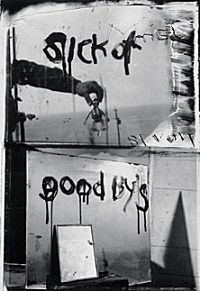
Sick of Goodby's
Mabou 1978
Robert Frank
Six reflections on the photography of Robert Frank
Lou Reed on
Sick of Goodby’s
I was looking at Robert Frank's photograph Sick of Goodby's in his book The Lines of My Hand. Moments before I had been listening to a Johnny Cash song called I Wish I Was Crazy Again. Then I thought of the goodbyes in the book to old friends caught once and for all and never again to be seen in life, and I was struck by the intensity of the sadness of life and its redeeming qualities as reflected in these moving photos. With Johnny Cash as well, the desire to see it all again, to go out one more time into the wild flame only to be burned up forever and never be seen again except in these farewell photos, is moving beyond description. The photos speak of an acceptance of things as they are. the inevitable death of us all and the last photo - that last unposed shot to remind us of our friends, of our loss of the times we had in a past captured only on film in black and white. Frank has been there, and seen that, and recorded it with such subtlety that we only look in awe, our own hearts beating with the memories of lost partners and songs.
To wish for the crazy times one last time and freeze it in the memory of a camera is the least a great artist can do. Robert Frank is a great democrat. We're all in these photos. Paint dripping from a mirror like blood. I'm sick of goodbyes. And aren't we all, but it's nice to see it said.
_______________________
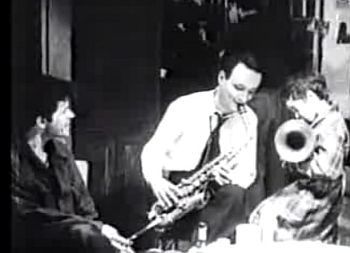
google video
Pull My Daisy
"A short 1959 film that typifies the "Beat Generation". Directed by Robert Frank and Alfred Leslie, Daisy was adapted by Jack Kerouac from the third act of a never-completed stage play entitled Beat Generation. Kerouac also provided improvised narration. It starred Allen Ginsberg, Gregory Corso, Larry Rivers, Peter Orlovsky, David Amram, Richard Bellamy, Alice Neel, Sally Gross, Delphine Seyrig and Pablo Frank, Robert Frank's then-infant son. Based on an incident in the life of Neal Cassady and his wife Carolyn." _______________________
Thinking about Robert Frank. The late Mabou-made messes, collaged combos with writing—sick of / goodby’s and hold still—keep going—drip and smudge and tape. Objects invading the pictorial plain / plane. How to scribble in a piece of writing, how to cover up (barely, so drawing attention to) earlier sketches, thumbnails. (Jack Spicer lemons.) How to make contiguous frames enjamb, the butting up plain a plain rebuttal of the desire to include everything. Salman Rushdie says of Frank: “Looking at the Mabou pictures, I remember these lines of Virginia Woolf: A masterpiece is not the result of a sudden inspiration but the product of a lifetime of thought.”
-
John Latta
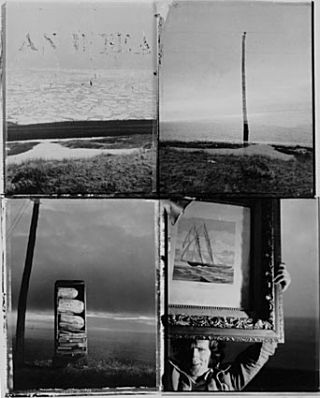
"Andrea, Mabou, 1977 (with ship) "
Robert Frank
_______________________
Address to the Reader, from Pevensey Sluice
Veronica Forrest-Thomson
If it were quicksand you could sink;
something needing a light touch
soon and so simply takes its revenge.
Slightly west of Goodwin Sands
the land hardens again with history,
resists the symbol.
Chalk requires an allegorical hand,
or employee of Sussex Water Board
who sets a notice here:
DANGER SUBMERGED STRUCTURES
and all at once Transformational Grammar
“peoples” the “emotional landscape”
with refutation.
You may hear its melancholy
long withdrawing roar
even on Dover beach watching
the undertow of all those trips
across to France.
Follow the reader and his writer,
those emblematic persons
along their mythic route
charting its uncertain curves and camber;
for to be true to any other you must —
and I shall never now — recover
a popular manoeuvre known mostly as,
turn over
and go to sleep.
Five Poems
Veronica Forrest-Thomson
Feature: Veronica Forrest-Thomson, 1947–1975jacketPoetic Artifice
Veronica Forrest-Thomson
(reg. req.)
pdf
aaaarg - free reg. req. _______________________
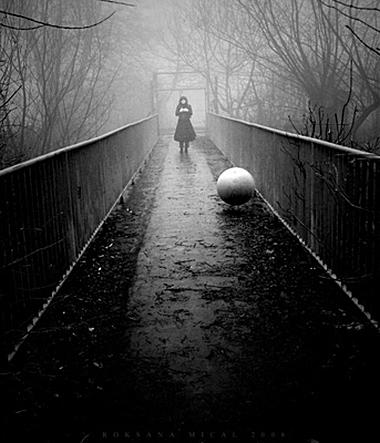
Roksana Mical
via La main gauche
_______________________
from
For The Year Of The Insane
O Mary, open your eyelids.
I am in the domain of silence,
the kingdom of the crazy and the sleeper.
There is blood here.
and I haven't eaten it.
O mother of the womb,
did I come for blood alone?
O little mother,
I am in my own mind.
I am locked in the wrong house.
Anne Sexton
November 9, 1928 – October 4, 1974
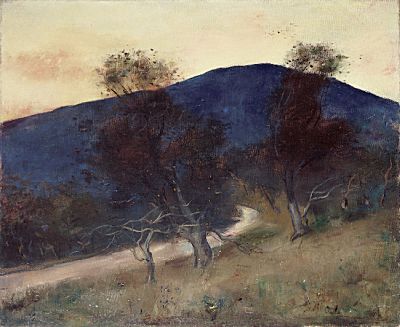
Lesser Ury
_______________________
The Jungle Line
Rousseau walks on trumpet paths
Safaris to the heart of all that jazz
Through I bars and girders-through wires and pipes
The mathematic circuits of the modern nights
Through huts, through Harlem, through jails and gospel pews
Through the class on Park and the trash on Vine
Through Europe and the deep deep heart of Dixie blue
Through savage progress cuts the jungle line
(...)
IThere's a poppy wreath on a soldier's tomb
There's a poppy snake in a dressing room
Poppy poison-poppy tourniquet
It slithers away on brass like mouthpiece spit
And metal skin and ivory birds
Go steaming up to Rousseau's vines
They go steaming up to Brooklyn Bridge
Steaming, steaming, steaming up the jungle line
- Joni Mitchell, b. November 7, 1943
_______________________
Three Poems
Tomaž Šalamun
Translated by Brian Henry
conjunctions
Pessoa Scolding Whitman
The whore of all solar systems and diligent
little ant, let’s begin with this restriction. Until here
cows, but here the guests can already wipe
their backs, except we dry this laundry
outdoors and the muffs also hang, although
it’s summer at Jama in Bohinj. Špela is already
a great-grandmother now, she has a certain grandson
who plays hockey at Tufts, already forgotten as well,
like those who played chess here:
Cvit, Raša, Avč, the awesome Montanists,
you can be mister God in your country
(Raša), but here in Oxford we wear coats
differently, also stutter a little, out of pathos,
so this then pours into our Carinthian blood
...(more)
_______________________

Albert Camus
November 7, 1913 – January 4, 1960
photo - Cecel Beaton
"On the poop deck of slave galleys it is possible, at any time and place, as we know, to sing the constellations while the convicts bend over the oars and exhaust themselves in the hold; it is always possible to record the social conversation that takes place on the benches of the amphitheater while the lion is crunching the victim. And it is very hard to make any objections to the art that has known such success in the past. But things have changed somewhat, and the number of convicts and martyrs has increased amazingly over the surface of the globe. In the face of so much suffering, if art insists on being a luxury, it will also be a lie."
-
Albert Camus, "Create Dangerously" in Resistance, Rebellian & Death
_______________________
Who Were the Witches?
Patriarchal Terror and the Creation of Capitalism
Alex Knight reviews Silvia Federici’s Caliban and the Witch: Women, the Body, and Primitive Accumulation
_______________________
If you want to have a compliant populace, what could be better than to say that everyone has to think positively and accept that anything that goes wrong in their lives is their own fault because they haven’t had a positive enough attitude? However, I don’t think that there is a central committee that sits there saying, “This is what we want to get people to believe.”
It took hold in the United States because in the ’80s and ’90s it became a business. You could write a book like Who Moved My Cheese?, which is a classic about accepting layoffs with a positive attitude. And then you could count on employers to buy them up and distribute them free to employees.
- Barbara Ehrenreich interviewed
_______________________
‘There is a Spectre Haunting . . .’:
Ghosts, Their Bodies,
Some Philosophers, a Novel and the Cultural Politics of Climate Change
Nick Mansfield
bordlerlands
The ghost descends on us from the spirit-world, half pagan animus, half Christian soul, it threatens us with the meaning that exceeds us, or what exceeds meaning, the meaning that exceeds meaning, the unknowable, that which has crossed over to the other unknowable side, and then come back. It means something more than us and more than we can understand. Locked as we are in the bodily world, our horizons limited by the degradation of flesh, the spirit terrifies us with things we have forgotten, crimes we have forgotten or suppressed, but that the all-seeing eye of death has always registered, un-erasable, unforgettable and unforgiven, over there. … Apparently.
The ghost is offered to us but slightly with-held, available to us if only ever just that little bit out of reach, like death itself, for our bodies but not of them, slightly ahead of them, when they pass over to become, when they connect with, when in fact they release something else. Ghosts fascinated Marx, we are told by Derrida, the spectre that is haunting Europe in the opening words of The Communist manifesto, for example, but also in his favourite play Hamlet, a text governed by a ghost, a dead father tormented in Purgatory by penance for un-expunged sins, and calling on a lackadaisical self-indulgent son to for pity’s sake do something, kill someone, make a ghost or two of his own and then die. And ghosts fascinate Derrida too, two philosophers, one the most nagging and persistent thinker of the material; the other, the most adventurous thinker of the forever-beyond that is with us now, the Other, the difference within, the stranger in the house, the different in the same, the other in the self and so on forever without rest.
Yet, the orthodox idea of the ghost as that abstract thing that exceeds the bodily has not been uncontested. For Freud in ‘The uncanny,’ the spirit-world of the soul is not something alien to the body, but a double of it, an insistence on its continuity despite death. The spirit-world is not abstract, but a version of the material, a projection of our very physical bodies, our fantasy refusal of bodily mortality, and thus an assertion of our belief in our continued material being.
How does this questioning of the polarity between the abstraction and the materiality of the ghost help us with Marx and Derrida? What can we find out here about ghosts and their relationship to the bodily from the two philosophers who either wouldn’t care for the ideal as a key to the material, or who would mock the difference between them? I want to approach the question of the relationship between the body and the ghost through Derrida’s reading of Bataille’s reading of Marx’s own haunting father-figure Hegel, and then to turn briefly to Christos Tsiolkas’s novel Dead Europe, to argue that there is nothing as bodily as a ghost, ghosts are bodies, the body, and the one that is with us now, coming from the past but through the future to throw everything up for grabs, what Tom Cohen calls, not quite following Derrida again, and Derrida’s not quite following of Levinas, the wholly other....(more)
_______________________
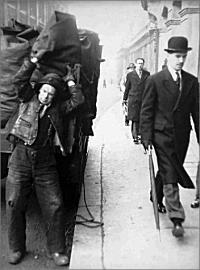
London
1951-52
Robert Frank
_______________________
ACTION YES Online Quarterly
Fall 2009
includes a Canadian Special curated by François Luong
from "On the Trail, the Image"
by François Turcot
translated from the French by François Luong
Step 1, Square 10
Vertigo in the neglected garden
the ruin cut from the others
spreads outward
(behind my lenses everything happens)
past the threshold a fence
a step for utterance
seven stops on a square
set
the pebble
bouncing against the slab
another stone
for the irregular front
Step 2, Square 8
To pierce the mandala
to leave history
the hostile foot wavers
as first step
(a falling star runs into the soil)
galvanized a water jug freezes
the long sun rebounds
in the hand
the image flees me still
Step 3, Square 7
In plan
In phase I walk the axis
memorize each stone comes forth
(destabilizing the grounds of others)
distortion contraction
feet together
here the future is not vertical
sway steady on the broken line
of the horizon
standing against the slowed landscape
of another stone
...(more)
Action Books
_______________________
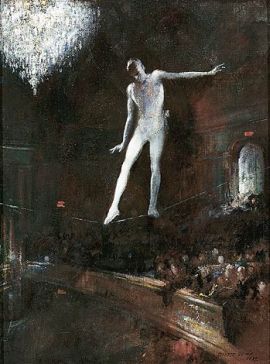 Tightrope Walker
1924
Everett Shinn
b. Nov. 6, 1876
_______________________
otoliths issue fifteen
Editor: Mark Young
Five Poems
Grzegorz Wróblewski
translated from the Polish by Adam Zdrodowski
otoliths
***
The Russians want to be the first through the looking glass.
The homeless are burning. (Mary claims that somebody has seen
a Tasmanian Wolf again...)
Our insatiable guts.
I can
Show up in front of the Pope
To discuss mediation with the Aliens.
I drank the vitamin dose allotted me,
I know a lot about bees
And hallucinogens.
...(more)
_______________________
Myth and Meaning
The 1977 Massey Lectures
Claude Lévi-Strauss
pdf
aaaarg - free reg. req.
An Introduction
Although I am going to talk about what I have written, my books and papers and so on,
unfortunately I forget what I have written practically as soon as it is finished. There is
probably going to be some trouble about that. But nevertheless I think there is also
something significant about it, in that I don’t have the feeling that I write my books. I
have the feeling that my books get written through me and that once they have got across
me I feel empty and nothing is left.
You may remember that I have written that myths get thought in man unbeknownst to
him. This has been much discussed and even criticized by my English-speaking
colleagues, because their feeling is that, from an empirical point of view, it is an utterly
meaningless sentence. But for me it describes a lived experience, because it says exactly
how I perceive my own relationship to my work. That is, my work gets thought in me
unbeknown to me.
I never had, and still do not have, the perception of feeling my personal identity. I
appear to myself as the place where something is going on, but there is no ‘I’, no ‘me.’
Each of us is a kind of crossroads where things happen. The crossroads is purely passive;
something happens there. A different thing, equally valid, happens elsewhere. There is no
choice, it is just a matter of chance.
I don’t pretend at all that, because I think that way, I am entitled to conclude that
mankind thinks that way too. But I believe that, for each scholar and each writer, the
particular way he or she thinks and writes opens a new outlook on mankind. And the fact
that I personally have this idiosyncracy perhaps entitles me to point to something which
is valid, while the way in which my colleagues think opens different outlooks, all of
which are equally valid.
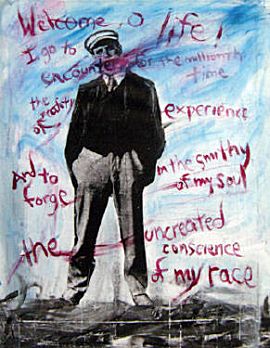
Lawrence Ferlinghetti: Evolution of a Painter
November 5, 2009 - December 19, 2009
George Krevsky Gallery
_______________________
Petit Testament
Ern Malley
In the twenty-fifth year of my age
I find myself to be a dromedary
That has run short of water between
One oasis and the next mirage
And having despaired of ever
Making my obsessions intelligible
I am content at last to be
The sole clerk of my metamorphoses.
Begin here:
In the year 1943
I resigned to the living all collateral images
Reserving to myself a man’s
Inalienable right to be sad
At his own funeral.
(Here the peacock blinks the eyes
of his multipennate tail.)
In the same year
I said to my love (who is living)
Dear we shall never be that verb
Perched on the sole Arabian Tree
Not having learnt in our green age to forget
The sins that flow between the hands and feet
(Here the Tree weeps gum tears
Which are also real: I tell you
These things are real)
So I forced a parting
Scrubbing my few dingy words to brightness.
...(more)
.....................................................
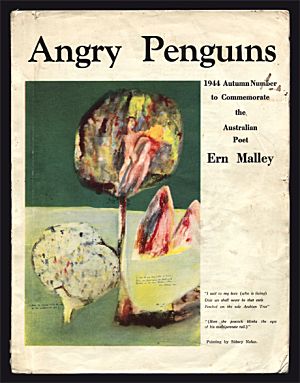
.....................................................
The Ern Malley Poetry Hoax — Introduction
David Lehman
jacket
THE greatest literary hoax of the twentieth century was concocted by a couple of Australian soldiers at their desks in the offices of the Victoria Barracks in Melbourne, land headquarters of the Australian army, on a quiet Saturday in October 1943.(....)
In a single rollicking afternoon McAuley and Stewart cooked up the collected works of Ernest Lalor Malley. Imitating the modern poets they most despised (‘not Max Harris in particular, but the whole literary fashion as we knew it from the works of Dylan Thomas, Henry Treece, and others’), they rapidly wrote the sixteen poems that constitute Ern Malley’s ‘tragic lifework.’ They lifted lines at random from the books and papers on their desks (Shakespeare, a dictionary of quotations, an American report on the breeding grounds of mosquitoes, etc.). They mixed in false allusions and misquotations, dropped ‘confused and inconsistent hints at a meaning’ in place of a coherent theme, and deliberately produced what they thought was bad verse. They called their creation Malley because mal in French means bad. He was Ernest because they were not.(....)
Ern Malley has always had an honored place among the poets of the New York School. Kenneth Koch printed two Malley poems, ‘Boult to Marina’ and ‘Sybilline,’ in the ‘collaborations’ issue of Locus Solus, the avant-garde literary magazine, in 1961. At Columbia University in 1968, Koch introduced his writing students to Malley’s poetry, suggesting that the hoaxer’s antics were well worth imitating not for purposes of polemic but for legitimate poetic ends. In 1976 John Ashbery asked his MFA students at Brooklyn College to compare Malley’s ‘Sweet William’ to one of Geoffrey Hill’s Mercian Hymns. Which did they think was the genuine article? (The students were divided.) Ashbery’s point — and it seems to be Malley’s point — is that intentions may be irrelevant to results, that genuineness in literature may not depend on authorial sincerity, and that our ideas about good and bad, real and fake, are, or ought to be, in flux....(more)
The Fall and Rise of Ernest Lalor Malley
Christine Wertheim cabinet
_______________________

Claude Levi-Strauss
1908 - 2009
It's nice, anyway, and hard not to read as an act of will, that the dean of structuralism should have waited until after the so-called post-structuralists were all dead before taking leave himself. I hope his work will enjoy a lot of critical re-examination in the coming years.
-
Justin Erik Halldór Smith
Just as the individual is not alone in the group, nor any one society alone among others, so man is not alone in the universe. When the spectrum or rainbow of human cultures has finally sunk into the void created by our frenzy; as long as we continue to exist and there is a world, that tenuous arch linking us to the inaccessible will still remain, to show us the opposite course to that leading to enslavement; man may be unable to follow it, but its contemplation affords him the only privilege of which he can make himself worthy; that of arresting the process, of controlling the impulse which forces him to block up the cracks in the wall of necessity one by one and to complete his work at the same time as he shuts himself up within his prison; this is a privilege coveted by every society, whatever its beliefs, its political system or its level of civilization; a privilege to which it attaches its leisure, its pleasure, its peace of mind and its freedom; the possibility, vital for life, of unhitching, which consists --Oh! fond farewell to savages and explorations!-- in grasping, during the brief intervals in which our species can bring itself to interrupt its hive-like activity, the essence of what it was and continues to be, below the threshold of thought and over and above society: in the contemplation of a mineral more beautiful than all our creations; in the scent that can be smelt at the heart of a lily and is more imbued with learning than all our books; or in the brief glance, heavy with patience, serenity, and mutual forgiveness, that, through some involuntary understanding, one can sometimes exchange with a cat.
-
Tristes Tropiques of 1955
_______________________
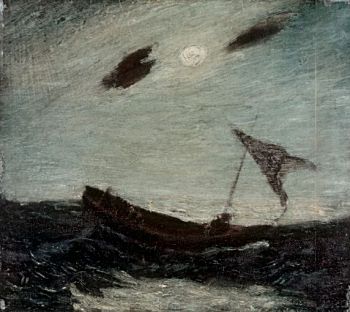
Albert Pinkham Ryder
1847 – 1917
_______________________
The Ships Move On
Hilda Morley
(1919 - 1998)
Freckles on my thighs, my legs—
I never had them
before (someone called my skin once the color of apricots)
the grey in my hair greyer,
grey to white even,
my face changing, becoming
a bit like my mother’s face
& I rarely
could see her as handsome
(though Eugene Morley saw it)
Faces of my women friends who were
beautiful when I met them,
so beautiful,
such promises of bliss I could
hardly believe they were real
or my face when M. said
“How do you feel carrying around
a face like that?”
Time has hollowed,
lined, dulled
the brilliance of eyes, the perfect matching
of curves, of mouth to forehead,
cheek to eyebrow, the proportions
shaken in all our faces
Those shapes which seemed to
exist only to please,
to pleasure
the soul,
to make the observer
stare, wrenched now a little,
twisted, obscured by
sags & puckers,
hidden
by pressure of years: a parchment
where everything leaves a trace
I had thought those contours
on my friend’s face hard & clear enough for
a profile on a ship’s prow
Life has written
on us
The ships move on
relentlessly
They carry us with them, caged
in whatever time has written
on us indelibly,
that amazing handwriting
(now only half-familiar)
on the skin of our years
Preface: For HildaRobert Creeley
Let Us Name the Most Unjustly and Bizarrely Forgotten U.S. Poet of the 20th Century
Kent Johnson
digital emunction _______________________
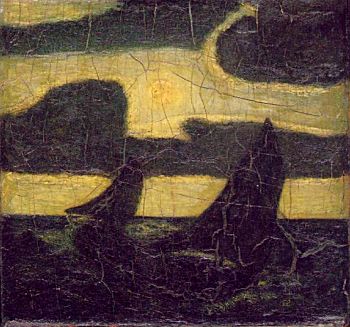
Albert Pinkham Ryder
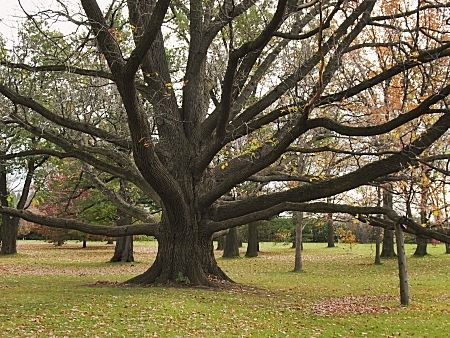
Bebb's Oak
(Quercus bebbiana)
Dominion Arboretum
Central Experimental Farm
a 500-hectare working farm in the center of Ottawa
photo - mw
_______________________
The Winemakers
John Ashbery
It wasn’t meant to stand for what it stood for.
Only a puptent could do that. Besides, we were in a state
called New York, where only bees made sense.
...(more)
In the 30th anniversary issue of The London Review of Books
_______________________
A Dry Black Veil
Brian Dillon on dust
Cabinet Magazine
In the section of the Arcades Project entitled “Boredom, Eternal Return,” Walter Benjamin briefly refers to the role of dust in the nineteenth-century interior, a substance at once magical and mundane: “Plush as dust collector. Mystery of dustmotes playing in the sunlight. Dust and the ‘best room’.... Other arrangements to stir up dust: the trains of dresses.”4 In the decaying Paris arcades—the furred arteries of the modern city—dust both occludes and outlines the once-novel commodity and its slow desuetude. For Marcel Proust, too, dust was simultaneously to be feared (in the form of the lime-tree pollen that brought on his asthma, or the choking fumes of the coal fire in ?his bedroom) and welcomed for the physical and aesthetic veil it cast about him as he wrote; Proust lived his last decade in a cloud of medicinal powders, propped up among material remnants of his past—photographs, books, and furniture—that he refused to allow his servants to dust. And a few years after Proust’s death, in the pages of his journal Documents, Georges Bataille pointed out that the dominion of dust in legend and reality had not yet been properly acknowledged:
The storytellers have not realised that the Sleeping Beauty would have awoken covered in a thick layer of dust; nor have they envisaged the sinister spiders’ webs that would have been torn apart at the first movement of her red tresses. Meanwhile dismal sheets of dust constantly invade earthly habitations and uniformly defile them: as if it were a matter of making ready attics and old rooms for the imminent occupation of the obsessions, phantoms, spectres that the decayed odour of old dust nourishes and intoxicates. When plump young girls, “maids of all work,” arm themselves each morning with a large feather-duster or even a vacuum-cleaner, they are perhaps not completely unaware that they are contributing every bit as much as the most positivist of scientists to dispelling the injurious phantoms that cleanliness and logic abhor.
(....)
This grotesque and opaque effluvium, Victorian successor to the miasma that appalled John Evelyn, is for Ruskin a real meteorological phenomenon; his second lecture is for the most part a defense of the first against the disbelieving and even mocking reactions of the press. But we ought surely to read too in Ruskin’s anguished account of the way the cloud has overcome him in recent years an image of history that contends with Benjamin’s more celebrated motif of the “angel of history.” Like Benjamin, Ruskin sees the rubbish of the world accumulating about him; but where Benjamin’s angel looks dolefully at its feet, the Victorian prophet looks to the sky, because he knows that the atmospheric and historical catastrophe will emerge, like a swirl of dust, out of the air itself....(more)
_______________________
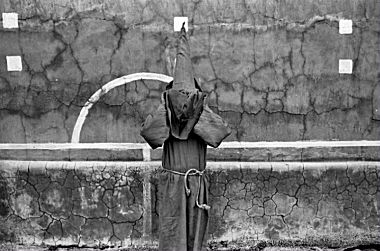
mystical geometry
ecuador
Religious Imagery
Pedro Meyer
curated by Elizabeth Ferrer
_______________________
...the moment you take for granted that a metaphor is the equivalent of the thing it describes or points to, is the moment when that metaphor is effectively dead. It's worse than useless for thinking with. But usually people go on using such metaphors long after they've ceased to generate any new ideas--which is one of the things a metaphor is supposed to help us do. People will just keep walking on in the resulting conceptual daze, because to think about it is like looking at the end of the world. Some will invest heavily in re-animating the corpse and blame the demise on the usual suspects: the all-powerful and infinitely devious upstart poor and other outsiders.
- Kia in a comment at the Gift Hub via Tom Matrullo
_______________________
The climate of history: Four theses
Dipesh Chakrabarty
There is much in the debate on climate change that should be of interest to those involved in contemporary discussions about history. For as the idea gains ground that the grave environmental risks of global warming have to do with excessive accumulation in the atmosphere of greenhouse gases produced mainly through the burning of fossil fuel and the industrialized use of animal stock by human beings, certain scientific propositions have come into circulation in the public domain that have profound, even transformative, implications for how we think about human history or about what the historian C. A. Bayly recently called "the birth of the modern world". Indeed, what scientists have said about climate change challenges not only the ideas about the human that usually sustain the discipline of history but also the analytic strategies that postcolonial and post-imperial historians have deployed in the last two decades in response to the post-war scenario of decolonization and globalization....(more)
_______________________
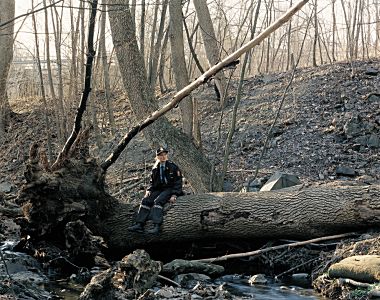
Close Encounter
Torbjørn Rødland
_______________________
Dream and Derangement
Georg Trakl
Nov. 3, 1914
In the evening the father became an old man; in dark rooms the countenance of the mother petrified and the curse of the degenerated race weighed on the boy. Sometimes he remembered his childhood, fulfilled with sickness, terror and eclipse, secret games in the star-garden, or feeding the rats in the dusking courtyard. From the blue mirror the narrow figure of the sister stepped and he fell as if dead into darkness. At night his mouth burst open like a red fruit and stars gleamed over his speechless grief. His dreams fulfilled the ancient house of the fathers.(....)
Deep is the slumber in dark poisons, fulfilled with stars and the white countenance of the mother, the stony one. Bitter is death, the fare of the guilt-laden; in the brown branches of the family tree the earthen faces decayed grinning. But quietly the other one sang in the green shadow of the elderberry, when he woke from evil dreams; sweet playmate, a rosy angel, approached him, so that he, a soft deer, slumbered into the night; and he saw the star-countenance of purity. The sunflowers sank golden over the garden fence when the summer came. O, the diligence of bees and the green leaves of the walnut tree; the thunderstorms passing by. Silverly the poppy bloomed also, bore in green bud our nocturnal star-dreams. O, how silent the house was when the father passed away into darkness. The fruit ripened purple on the tree and the gardener moved his hard hands; o the hairy signs in the radiant sun. But silently in the evening the shadow of the dead man entered the grieving family circle and his step sounded crystalline over the green meadow before the forest. Muted ones, those gathered around the table; dying ones with waxen hands they broke the bread, the bleeding. Woe of the sister's stony eyes, when at the meal her insanity appeared on the brother's forehead, when under the mother's suffering hands the bread turned to stone. O, of the putrefied ones, when with silver tongues they silenced hell. Thus the lamps in the cool room died out and through purple masks the suffering humans looked at each other silently. The night long rain poured down, and recreated the meadow. In thorny wilderness the dark one followed the yellowed paths in the corn, the song of the lark and the soft stillness of green branches, so that he might find peace. O, you villages and mossy stages, glowing sight. But bonily the steps stagger over sleeping snakes at the forest edge and the ear always follows the raving scream of the vulture. In the evening he found a stony solitude, a dead man's escort into the dark house of the father. Purple cloud covered his head, so that he silently attacked his own blood and effigy, a moony countenance; stony sank away into emptiness, when in a broken mirror a dying youth, the sister appeared; the night engulfed the cursed race....(more)
German original - Traum und Umnachtung
Wersch's Trakl-Site .....................................................
An Autumn Evening
Georg Trakl
For Karl Röck
The brown village. A darkness often treads
Along the walls that stand in autumn. Mock-
Shapes: man as well as woman, dead now, walk
In the cold parlours to prepare their beds.
Here young boys play. A heavy shadow spreads
Over brown dung. Servant women walk
Through the moist blue, and sometimes their eyes mock
It, longing, as bells toll above their heads.
An inn leans for the down and lonely there.
Patiently it waits beneath dark arches,
Moved by clouds of gold tobacco smoke,
Yet always black and near. A stranger soaked
In booze stands in the shade of older arches
After the wild birds take to the air.
-
Translated from the German by Leo Yankevich
_______________________

photo - mw
_______________________
Hearing Heidegger and Saussure
Elmer G. Wiens
According to Heidegger, Saussure's scientific theory of language cannot "bring us to language as language." While Heidegger helps to elucidate Saussure's semiology, Heidegger requests language as language speaking to grant "an abode for the being of mortals." Language that speaks merely the emotions of mortals, at most, repeats itself. As such, Heidegger calls on language speaking and Heidegger listening to direct his choice of an original poem that speaking purely will provide the learning experience for mortals to "live in the speaking of language." Poets such as Georg Trakl privileged with primal knowledge experience language speaking—calling mortals into the experience—an experience spanning the abyss of reason and language containing each other. Is primal knowledge awareness, a pre-experience of one's death hearkening to birth? The poet of Psalms writes, "I walk through the valley of the shadow of death," addressing his Lord. Unlike the Psalmist, Heidegger's poet absents his presence from the "place of arrival" of the poem, not having called himself there.
Trakl's poem, as text, is linear, a string of words. Writing as recorded speech is linear. Speech encountered verbally or thought is also linear. Saussure says speech and writing are one-dimensional. Trakl, responding to language speaking, imagines "A Winter's Evening," expressing linearly his non-linear experience. He writes, turning his learning into the stillness of the onefold's string of words. Though Heidegger posits a fourfold world in "A Winter Evening," he experiences the mental associations of the poem's string of words linearly in time. As Heidegger writes, he recursively deconstructs preceding sub-strings of his text, reconstructing his experiences encountering Trakl's poem. Trakl, acutely aware of the dif-ference between his original experience and the experience of reading linearly his poem, abnegates not only himself but also the poem's narrator. This alienation is the sign of mastery according to Heidegger. Trakl's self denial is absolute. Explicating the poem, Heidegger accepts his call into Being as the poem's narrator and involves himself in the text of "A Winter Evening."
A Winter Evening
Georg Trakl
Window with falling snow is arrayed.
Long tolls the vesper bell,
The house is provided well,
The table is for many laid.
Wandering ones, more than a few,
Come to the door on darksome courses.
Golden blooms the tree of graces
Drawing up the earths cool dew.
Wanderer quietly steps within;
Pain has turned the threshold to stone.
There lie, in limpid brightness shown,
Upon the table bread and wine.
_______________________
The PennSound Anthology of Restoration and 18th-Century Verse
edited and performed by John Richetti
_______________________
Recovering Resentment:
A Reflection on Disgust, Empathy, and Milton's Satan
Brad D. Baumgartner
"To write is certainly not to impose a form (of expression) on the matter of lived experience. Literature rather moves in the direction of the ill-formed or the incomplete... always in the midst of being formed, and goes beyond the matter of any livable or lived experience." -- Gilles Deleuze
Resentment, like literature, reorders and challenges the opacity of the most familiar landscapes, opening and transforming them into fields of possibility, in which things do not appear firmly codified, but rather stand out as fluid and promising. It is under the influence of resentment that we come to understand that neither our identities nor the worlds we inhabit are fixed or stable--and thus it is little surprise that literature should so often return to this most central of themes. Oftentimes writers call into question the conventional conflict of resentment, in favor of a view of literature as an ecstatic movement towards comprehension--an expansion of its powers under the spell of personal livable or lived experience.
(....)
Milton's account of Satan puts a complex series of observations into focus. According to Heidegger, "the artist remains inconsequential as compared with the work, almost like a passageway that destroys itself in the creative process for the work to emerge."[44] But the act of empathic re-appropriation sets up an alternating struggle of subject with object. Milton made an example of Satan; he was too far gone for redemption. Milton's work sculpts the psyche of the subjugated public, however, for a paradigm shift. Here's the push from Milton: seventeenth century readers will forget that they have failed time and time again, and will try once more as if subjugation never happened. In this way they strive to the conviction that there are infinite sources of strength from which they may draw. Again and again they will aspire to grace, which will lift them up and carry them onwards. And for this nudge to see fruition, the people must become capable of living into the future and not let hegemonic England displace their striving. The capacities by which a people gains freedom from bondage lie dormant within each and every one of us. Only a people who have passed through the gate of disgrace can fully ascend to the heights of liberation. ...(more)
_______________________
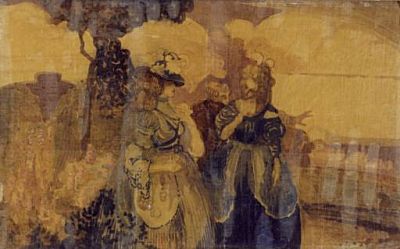
In the Blue Country
or Colloque Sentimentale
circa 1895
Charles Conder
b. Oct. 24, 1868
_______________________
The Mood of Depression
Georg Trakl
translated by James Wright and Robert Bly
You dark mouth inside me,
You are strong, shape
Composed of autumn cloud,
And golden evening stillness;
In the shadows thrown
By the broken pine trees
A mountain stream turns dark in the green light;
A little town
That piously dies away into brown pictures.
Now the black horses rear
In the foggy pasture.
I think of soldiers!
Down the hill, where the dying sun lumbers,
The laughing blood plunges,
Speechless
Under the oak trees! Oh the hopeless depression
Of an army; a blazing steel helmet
Fell with a clatter from purpled foreheads.
The autumn night comes down so coolly.
With her white habit glittering like the stars
Over the broken human bodies
The convent nurse is silent.
Twenty Poems of Georg Trakl [pdf]
Translated and Chosen James Wright and Robert Bly
|
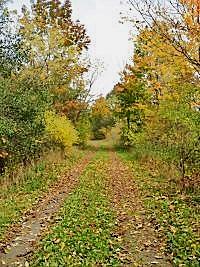
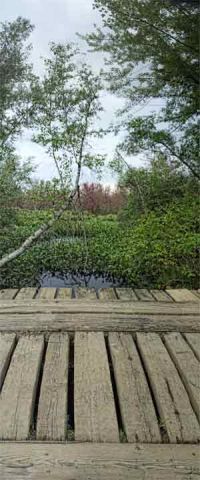
 Janus Head
Janus Head

 The Age of Briggs & Stratton
The Age of Briggs & Stratton








































